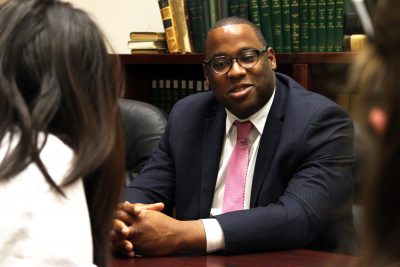
Boston City Councilor Tito Jackson engaged in a discussion with a group of student newspaper representatives at City Hall about how President Donald Trump’s executive orders will affect Boston.
Jackson said preserving the city’s historic values is especially important considering Boston is a city founded in revolution and acceptance.
“We are the birthplace of the American Revolution, and I think this is the beginning of a second American Revolution. One of hope, one of unity and one of solidarity, and going back to who and what we are as a country and Boston as a city,” Jackson said. “It is critical that we exhibit courageous leadership and that silence is complicit.”
In light of the recent immigration ban, Jackson emphasized the need to maintain Boston’s sanctuary status.
“Immigrants make up a vital part of our city’s community, a huge part of our economy in this region, with tens of thousands of international students,” Jackson said. “If this becomes a place that is not safe for those who are undocumented … this will become a region and a city that is not attractive to people from all over the world.”
Jackson highlighted the effects of Trump’s actions on Boston Public Schools, including the pressures facing many students and their families and the necessity of ensuring their protection.
“Perception is as important to reality when it comes to the current atmosphere driven by Donald Trump’s complete and total disregard for the American Constitution,” Jackson said. “It is critical that we let our families in the Boston Public Schools know … you will be safe in your school, that [U.S. Immigration and Customs Enforcement] would have to receive the expressed and written consent of the superintendent of schools, as well as the local DA, to enter a school building.”
Jackson said although Boston may face federal grants being stripped from the city under a Trump presidency, he believes the local government has legal standing in the matter.
“Money that is attached to turning our back on our most vulnerable students is not money that we should be pursuing,” Jackson said. “I think the City of Boston would have the right to sue the federal government to receive our rightful stake in the federal budget … it is also our right, as duly elected government officials, to pass our own laws and to determine how … Boston is run.”
Jackson pointed out how student activism can play an essential role in the democratic process and improve the government at all levels.
“Students have always been at the vanguard of social movements in our country and it is critical that we listen to the very important, well-informed and impatient voice of students,” Jackson said.
Toward the end of the discussion, Jackson expanded conversation to include comments about the economic disparities among various communities in Boston, as 50 percent of people in Boston make $35,000 or less, according to Jackson.
“People should have affordable housing that is contextually relevant to their neighborhood and community,” Jackson said.
Jackson said white families in the city also have a significantly larger net worth than black families.
“The median net worth of a white family in Boston in 2015 was $247,500 and the median net worth of a black family in 2015 was $8,” Jackson said. “We either all rise or we all fall.”
Jackson said the city is not currently meeting the needs of the most vulnerable citizens, and that if elected mayor, he would work to change this.
“We are not meeting the needs of those who are sick, those who need our help,” Jackson said. “The Boston I want to build will bring government to the people in a way that we have not seen before, and will empower the voices of neighborhoods, communities, young people and elders.”


















































































































